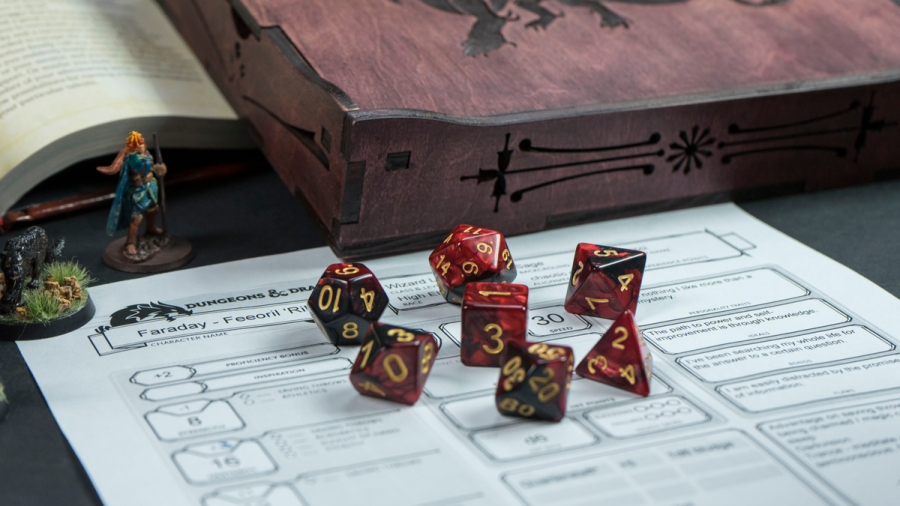Examining the rise of nerd culture
Nerds have made their way into popular culture over recent years
Elements of nerd culture, like “Dungeons and Dragons” remain marginalized.
February 24, 2022
Not too long ago, a nerd was considered to be someone who read comic books, obsessed over “The Lord of the Rings” and spent afternoons at the arcade. Nerds were harassed constantly for their hobbies to the point that many kept them hidden. However, the last few decades have unraveled the seclusion of nerd culture, carrying these hobbies and subjects into mainstream territory for everyone to enjoy.
With the production of “Star Wars” (1977) and “Superman: The Movie” (1978), state-of-the-art computer-generated imagery (CGI) coupled with never-before-seen action sequences lured audiences of all different interests to the previously fabricated realm of nerdom.
As computers and other electronic devices entered into the equation, video games became a new force on the market. Consoles like the Nintendo NES and Atari took over household television auxiliary ports, blurring the lines of the common entertainment consumer and the traditional nerd. Nowadays, you can catch almost anyone planning to see the new Marvel movie on opening weekend, playing Xbox or geeking out over Star Wars Land — the stigma has diminished tremendously.
Mainstream media and popular culture both have played a large role in the popularization of traditionally nerdy activities. This makes them more palatable to the average person. After all, if Jason Mamoa is willing to put on tights to breathe life into the image of Aquaman, then there’s a supremely simple explanation as to why the masses are willing to herd in front of their screens.
As popular and beloved actors and actresses line up to portray characters from comic books and “nerdy” literature, nerd culture becomes permissible in society. There’s no denying the nerdy paradigm was one of a skinny boy with a collared shirt and glasses, so once that notion goes by the wayside, people are able to run rampant with their new, socially acceptable interests.
Although nerd culture has spread to the masses and become far less stigmatized, there are still elements that are vilified. Games like “Dungeons and Dragons” and “World of Warcraft” remain tethered to the image of the outcasted nerd, and the normal person can never dare to cross that threshold without fear of social defamation. Why is this the case?
Popular culture hasn’t even dared to touch the deeper dimensions of nerd culture. If the subject can’t be turned into a movie or show, it probably won’t ever be considered worthy outside the world of nerds.
Despite this, nerds don’t really seem to care. Many people who have found their place in nerd culture have become gatekeepers of their beloved hobbies.
For instance, many fans of Robert Jordan’s “The Wheel of Time” series hold it so close to their hearts that the thought of a production company attempting to create a television show fills them with disdain. Fans of the series believe the story shouldn’t be introduced to those who haven’t read it because they hold a strong sense of entitlement for their dedication to the series.
In fact, some nerds are so protective over their favorite stories and hobbies that they gatekeep them even when conversing with fellow nerds. They’ll ask them painfully specific questions regarding their knowledge of the nerdy topic in order to confirm their depth of interest in the subject.
What many nerds fail to realize is that if their activities were represented in popular culture and enjoyed by more people they would also become less stigmatized. More people would be accepting of — and even take part in — events like Comic-Con and the reading of comic books.
But maybe some elements of nerd culture are meant to be secluded from the majority of society. Maybe nerds like living in their sheltered world of hobbies because it is simpler than attempting to relate to those who simply “like” something instead of completely immersing themselves in it. Maybe nerd culture is destined to remain as such, instead of melding with popular culture.















will massey • Nov 2, 2022 at 6:05 pm
i would definitely agree with the kind of research that you conducted on here and based careful and sound research because most of these so called experts would always assume that all nerd culture is all about being a overachiever based on the stereotype of a nerd in popular culture and that is actually misleading because in you what said about nerd culture is more about like the kind of media and academics that`s what makes nerd culture based on what you said